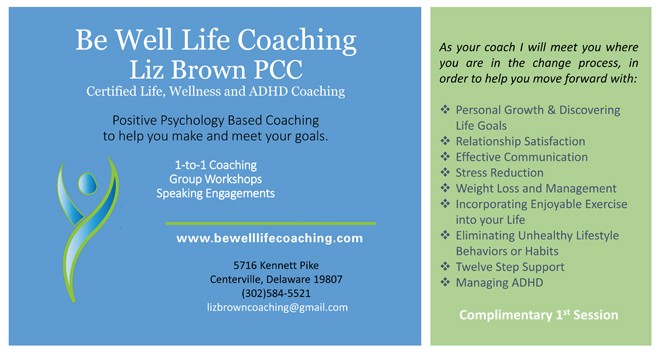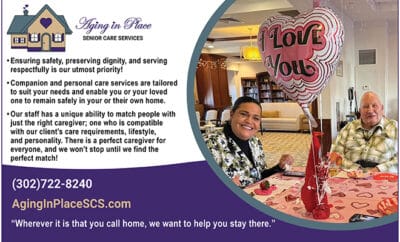ADHD: Not Just A Childhood Disorder
 By Liz Brown, Be Well Life Coaching
By Liz Brown, Be Well Life Coaching
Many think ADHD or ADD as it is commonly known is just a childhood disorder. In reality, 70% of childhood sufferers continue to have symptoms as adults. ADHD is an often misunderstood neurobehavioral disorder affecting approximately
11% of school aged children and 8% of all adults.
There Are Two Types of ADHD: Inattentive or Hyperactive/Impulsive.
A person can have one type or a combination of both. Classic symptoms are a combination of restlessness, distractibility, impulsiveness, forgetfulness, procrastination, losing track of time and possessions, difficulty planning, clutter, troubled relationships, trouble concentrating, sleep disturbances and at times hyper-focus. Teen and adult symptoms are generally different from symptoms in children. In adults, hyperactivity may feel more like restlessness. It can result in excessive talking or racing thoughts. Impulsiveness can result in spending too much, eating too much, interrupting others or blurting out words without thinking.
Adult Diagnosis
Many people are undiagnosed until adulthood even though their symptoms have been a lifelong challenge. Sadly, these adults may have been unfairly labeled as children as lazy, impulsive, stupid, messy, or unmotivated. Fortunately, over the past decade increased overall awareness of the disorder has helped more adults get a proper diagnosis. Adults receiving an ADHD diagnosis are often relieved to have revealed to them at last the cause of their attention, memory, impulsiveness or organization deficits. This relief often far outweighs any negative connotations some might have with an ADHD diagnosis. Better still, the diagnosis brings awareness and with it the ability to take action to improve symptoms by coming up with a treatment plan that works.
Treatment Options
While numerous medications exist which are used to help lessen symptoms of ADHD, research shows that medication alone will not work fully, as many of the symptoms noted here are actually life skills – and these skills can be better-improved through other means. Studies have found that an integrative treatment approach that includes non-medication based treatments works best for long-term management. Integrative treatments include ADHD coaching, therapy, accommodations at school or home, proper nutrition, sleep ma nagement, stress management, neurofeedback and aerobic exercise in addition to several other options.
Coaching Support For ADHD
An ADHD coach is a life coach who specializes in helping with the unique challenges of ADHD. The purpose of coaching is to facilitate lasting change by helping the individual to gain self-awareness and learn new skills to reach personal goals. For instance, a coach can: help an individual develop systems for managing and organizing time and belongings; design strategies to manage and even control impulsive behaviors and thereby improve relationships; identify an individual’s unique strengths which they can then use to mitigate weaknesses; help a person overcome the procrastination and the overwhelm that often occurs in ADHD. In all cases, a coach provides support, and helpful feedback, as the plan unfolds and progress is made.
In addition, an ADHD coach can specifically help identify executive function challenges that are hindering success. We help you apply strategies to your challenges so you can reach your goals.
Combining Wellness And ADHD Coaching
Sleep, proper nutrition, aerobic exercise and stress management are all critical factors in managing and thriving with ADHD. Creating a plan which incorporates all of these components of wellness will help improve attention and memory, reduce impulsivity and hyperactivity, and help the mind relax. Evidence shows that mindfulness can help with management of many symptoms including racing mind, difficulty in relationships, and even the low self-esteem that results from years of struggle. A wellness coach can help identify obstacles in these areas and help develop workable solutions with the client.
Testimonials:
“Individuals with ADHD often feel shame and embarrassment in their ability to ‘get it together’, which means having a coach with a compassionate attitude is crucial; Liz has that attitude as well as a deep knowledge base of ADHD treatment strategies.” ~ L.S. Wilmington
“Liz helped bring awareness to the various ways my ADHD symptoms were influencing my life, so that I can continue to use my newfound skills and strategies in all areas of life.” ~ S. H. Newark
Credentials:
Liz Brown is an ICF Professional Certified Life, Wellness and ADHD Coach. Her mission is to help clients identify their personal and professional dreams, goals and visions and support them every step of the way to sustained success.
Wondering whether coaching is for you? You can determine that.
To learn more or to schedule a complimentary one-hour session, please call me at 302.584.5521 or email [email protected]






